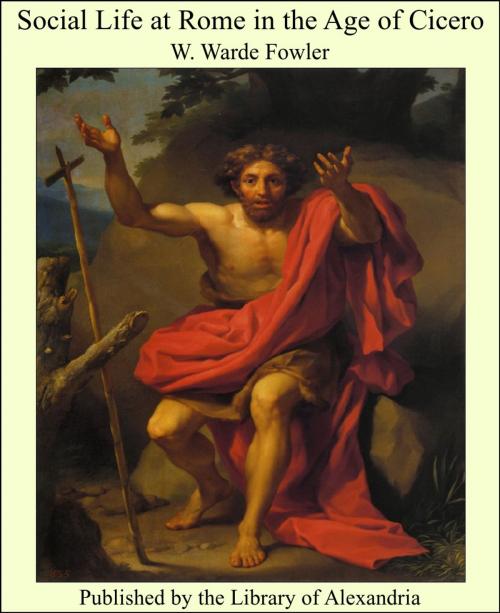Social Life at Rome in the Age of Cicero
Nonfiction, Religion & Spirituality, New Age, History, Fiction & Literature| Author: | W. Warde Fowler | ISBN: | 9781465500649 |
| Publisher: | Library of Alexandria | Publication: | March 8, 2015 |
| Imprint: | Language: | English |
| Author: | W. Warde Fowler |
| ISBN: | 9781465500649 |
| Publisher: | Library of Alexandria |
| Publication: | March 8, 2015 |
| Imprint: | |
| Language: | English |
This book was originally intended to be a companion to Professor Tucker’s Life in Ancient Athens, published in Messrs. Macmillan’s series of Handbooks of Archaeology and Art; but the plan was abandoned for reasons on which I need not dwell, and before the book was quite finished I was called to Other and more specialised work. As it stands, it is merely an attempt to supply an educational want. At our schools and universities we read the great writers of the last age of the Republic, and learn something of its political and constitutional history; but there is no book in our language which supplies a picture of life and manners, of education, morals, and religion in that intensely interesting period. The society of the Augustan age, which in many ways was very different, is known much better; and of late my friend Professor Dill’s fascinating volumes have familiarised us with the social life of two several periods of the Roman Empire. But the age of Cicero is in some ways at least as important as any period of the Empire; it is a critical moment in the history of Graeco-Roman civilisation. And in the Ciceronian correspondence, of more than nine hundred contemporary letters, we have the richest treasure-house of social life that has survived from any period of classical antiquity. Apart from this correspondence and the Other literature of the time, my mainstay throughout has been the Privatleben der Roemer of Marquardt, which forms the last portion of the great Handbuch der Roemischen Altertuemer of Mommsen and Marquardt. My debt is great also to Professors Tyrrell and Purser, whose labours have provided us with a text of Cicero’s letters which we can use with confidence; the citations from these letters have all been verified in the new Oxford text edited by Professor Purser. One Other name I must mention with gratitude. I firmly believe that the one great hope for classical learning and education lies in the interest which the unlearned public may be brought to feel in ancient life and thought. We have just lost the veteran French scholar who did more perhaps to create and maintain such an interest than any man of his time; and I gladly here acknowledge that it was Boissier’s Ciceron et ses amis that in my younger days made me first feel the reality of life and character in an age of which I then hardly knew anything but the perplexing political history. I have to thank my old pupils, Mr. H.E. Mann and Mr. Gilbert Watson, for kind help in revising the proofs
This book was originally intended to be a companion to Professor Tucker’s Life in Ancient Athens, published in Messrs. Macmillan’s series of Handbooks of Archaeology and Art; but the plan was abandoned for reasons on which I need not dwell, and before the book was quite finished I was called to Other and more specialised work. As it stands, it is merely an attempt to supply an educational want. At our schools and universities we read the great writers of the last age of the Republic, and learn something of its political and constitutional history; but there is no book in our language which supplies a picture of life and manners, of education, morals, and religion in that intensely interesting period. The society of the Augustan age, which in many ways was very different, is known much better; and of late my friend Professor Dill’s fascinating volumes have familiarised us with the social life of two several periods of the Roman Empire. But the age of Cicero is in some ways at least as important as any period of the Empire; it is a critical moment in the history of Graeco-Roman civilisation. And in the Ciceronian correspondence, of more than nine hundred contemporary letters, we have the richest treasure-house of social life that has survived from any period of classical antiquity. Apart from this correspondence and the Other literature of the time, my mainstay throughout has been the Privatleben der Roemer of Marquardt, which forms the last portion of the great Handbuch der Roemischen Altertuemer of Mommsen and Marquardt. My debt is great also to Professors Tyrrell and Purser, whose labours have provided us with a text of Cicero’s letters which we can use with confidence; the citations from these letters have all been verified in the new Oxford text edited by Professor Purser. One Other name I must mention with gratitude. I firmly believe that the one great hope for classical learning and education lies in the interest which the unlearned public may be brought to feel in ancient life and thought. We have just lost the veteran French scholar who did more perhaps to create and maintain such an interest than any man of his time; and I gladly here acknowledge that it was Boissier’s Ciceron et ses amis that in my younger days made me first feel the reality of life and character in an age of which I then hardly knew anything but the perplexing political history. I have to thank my old pupils, Mr. H.E. Mann and Mr. Gilbert Watson, for kind help in revising the proofs















